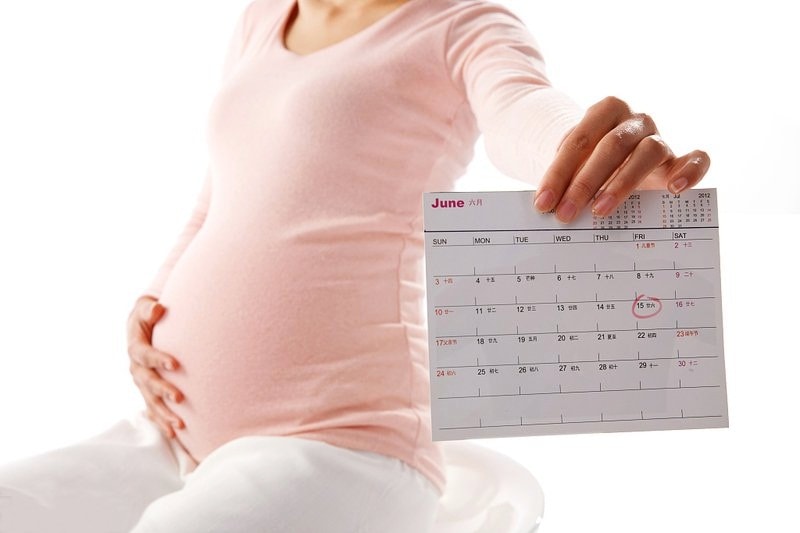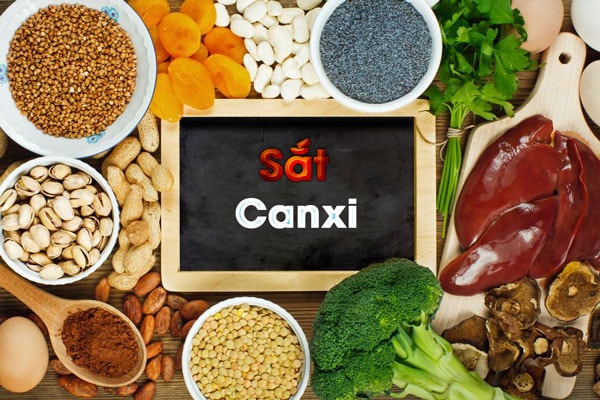How to take iron, calcium and DHA for pregnant women to absorb effectively according to expert advice
Detailed instructions on how to take iron, calcium and DHA for pregnant women, from absorption mechanisms to practical tips, suitable for both beginners and those who want to optimize their nutritional regimen during pregnancy.
- Why do pregnant women need to supplement iron, calcium and DHA?
- Absorption mechanism of iron, calcium and DHA in the body
- When to supplement iron, calcium and DHA during pregnancy
- Comparison of iron, calcium and DHA: Characteristics and supplementation
- Detailed instructions on how to take iron, calcium and DHA
- 1. Take iron properly
- 2. Take calcium properly
- 3. Take DHA properly
- Common mistakes when supplementing iron, calcium and DHA
- Iron, calcium and DHA intake schedule
- Frequently Asked Questions
- Conclude
Why do pregnant women need to supplement iron, calcium and DHA?
.jpg)
Pregnancy is a period when the mother's body needs to provide nutrients not only for herself but also for the developing fetus. Iron, calcium and DHA play an important role in supporting the health and development of the baby:
- Iron:Helps create hemoglobin, transport oxygen in the blood, prevent iron deficiency anemia - a common condition in pregnant women.
- Calcium:Essential for the development of fetal bones and teeth, and maintaining maternal bone health.
- DHA:Is an important omega-3 fatty acid, supporting the development of the baby's brain and vision.
However, improper supplementation or improper timing during pregnancy can reduce absorption efficiency, even cause side effects such as constipation, nausea. So how to take it properly and at what time during pregnancy?
Absorption mechanism of iron, calcium and DHA in the body
To understand how to drink effectively, you first need to understand how the body absorbs these substances:
- Iron:Iron is absorbed mainly in the duodenum and first part of the small intestine. Iron is best absorbed on an empty stomach (1-2 hours before or after meals). Vitamin C helps increase iron absorption, while calcium and tannins (in tea and coffee) can hinder it.
- Calcium:Calcium needs the acidic environment of the stomach to dissolve and be absorbed. It competes with iron and some other minerals for absorption, so it should be taken away from these substances.
- DHA:Being a fat, DHA is better absorbed when taken with a meal containing healthy fats (such as fish oil, avocado).
Why shouldn't you take iron and calcium at the same time?Because they compete for absorption in the small intestine, reducing the effectiveness of both.
When to supplement iron, calcium and DHA during pregnancy

The timing of supplementing these substances during pregnancy depends on the nutritional needs of mother and baby at each stage:
- Iron:
- First trimester (weeks 1-12):Iron needs increase slightly as your body begins to produce more blood. Start supplementation if your doctor detects anemia or risk of iron deficiency.
- Middle trimester (weeks 13-27):Iron requirements increase due to rapid fetal development, especially the circulatory system. Take regularly as directed (usually 27-60mg/day).
- Last 3 months (weeks 28-40):Continue iron supplementation to support increased blood volume and iron reserves for the baby after birth.
- Calcium:
- First trimester (weeks 1-12):Calcium needs are not high, can be supplemented through food (milk, cheese, green vegetables).
- Middle trimester (weeks 13-27):Start calcium supplementation (1,000-1,300mg/day) because the fetus's bones and teeth are forming strongly.
- Last 3 months (weeks 28-40):Calcium needs are highest due to rapid bone development of the fetus. Make sure to take enough dose, divided into 2-3 times/day.
- DHA:
- First trimester (weeks 1-12):Supplement DHA (200-300mg/day) to support the formation of the brain and nervous system of the fetus.
- Middle trimester (weeks 13-27):Continue to supplement DHA for brain and vision development.
- Last 3 months (weeks 28-40):Especially important because this is the stage when the baby's brain develops most strongly. Make sure to supplement regularly.
Note:Always consult your doctor to determine specific starting times and dosages, as nutritional needs may vary depending on your health condition.
Comparison of iron, calcium and DHA: Characteristics and supplementation
| Nutrients | Role | Time to drink | Time of pregnancy | Note |
|---|---|---|---|---|
| Iron | Prevent anemia, support circulation | In the morning, on an empty stomach | From week 1, increase dose from week 13 | Combine vitamin C, avoid tea/coffee |
| Calcium | Fetal bone and tooth development | Lunch or dinner, after meals | Enhanced from week 13-40 | Do not take with iron |
| DHA | Brain and vision development | During or after meals | Throughout pregnancy, especially weeks 28-40 | Prioritize foods containing fat |
Detailed instructions on how to take iron, calcium and DHA

1. Take iron properly
Recommended dosage:According to the World Health Organization (WHO), pregnant women need 27-60mg of iron per day, depending on their health status.
Time to drink:
- Take in the morning, on an empty stomach (1-2 hours before breakfast or 2 hours after eating).
- Combine with orange juice or foods rich in vitamin C (such as guava, kiwi) to increase absorption.
- Avoid taking with tea, coffee, milk or calcium-rich foods as they reduce iron absorption.
Practical tips:
- Choose organic iron tablets (such as ferrous gluconate) to reduce stomach irritation.
- If constipated, drink plenty of water and eat foods rich in fiber (green vegetables, fruits).
- Consult your doctor if you experience side effects such as nausea or stomach pain.
2. Take calcium properly
Recommended dosage:Pregnant women need 1,000-1,300mg of calcium per day, divided into 2-3 doses.
Time to drink:
- Take at noon or evening, 1-2 hours after meals to optimize absorption.
- Do not take with iron tablets, at least 2-3 hours apart.
- Choose calcium carbonate tablets (well absorbed in an acidic environment) or calcium citrate (better absorbed on an empty stomach).
Practical tips:
- Do not take more than 500mg of calcium at a time to avoid overloading the kidneys.
- Combine with foods rich in vitamin D (salmon, eggs) to increase calcium absorption.
- Avoid foods containing oxalates (such as spinach) when taking calcium.
3. Take DHA properly

Recommended dosage:Pregnant women need 200-300mg of DHA per day, according to the American Pregnancy Association.
Time to drink:
- Take during or immediately after a meal containing fat (such as fish, avocado, olive oil).
- Can be taken at night to reduce the fishy taste of fish oil capsules.
Practical tips:
- Choose DHA pills from marine fish sources (such as salmon, sardines) to ensure quality.
- Store tablets in a dry place, away from sunlight to maintain DHA quality.
- If you don't like the fishy smell, choose DHA capsules with an odorless coating.
Common mistakes when supplementing iron, calcium and DHA
Many pregnant women have difficulty supplementing these nutrients due to lack of information. Here are some common mistakes and how to fix them:
- Taking iron and calcium at the same time:Reduces absorption of both substances.Fix:Take at least 2-3 hours apart.
- Skip the recommended dose:Drinking too much can be harmful (such as kidney stones due to excess calcium).Fix:Consult your doctor for dosage adjustment.
- Starting supplementation too late:For example, calcium supplementation only from the 7th month will not be enough for the bone development needs of the fetus.Fix:Start supplementation from week 13 or as directed by your doctor.
- Not to be combined with diet:Food greatly affects absorption.Fix:Combine vitamin C with iron, vitamin D with calcium, and fat with DHA.
Iron, calcium and DHA intake schedule
.jpg)
Below is a reference schedule for pregnant women to optimize absorption:
- 7:00 AM:Take iron tablets with orange juice, before breakfast (from week 1, increase dose from week 13).
- 12:00 noon:Take calcium after lunch (from weeks 13-40).
- 7:00 PM:Take DHA after dinner (throughout pregnancy, especially weeks 28-40).
Note:Adjust your schedule according to your doctor's instructions and personal health condition.
Frequently Asked Questions
1. Can I take iron, calcium and DHA at the same time as a multivitamin?
Yes, but absorption efficiency may be reduced due to competing substances in the gut. It is best to choose individual supplements and take them at the right time.
2. Constipation after taking iron, what should I do?
Switch to organic iron, drink plenty of water, eat fiber, and consult your doctor about changing medications.
3. Do I need to supplement DHA if I eat fish?
If your diet provides 200-300mg of DHA per day, you do not need to supplement. However, DHA capsules ensure the correct dosage.
4. When should I start taking calcium supplements?
Calcium requirements increase from the 4th month (week 13). Start supplementation from this time or as directed by your doctor.
Supplementing iron, calcium and DHA properly and at the right time during pregnancy not only helps pregnant women stay healthy but also supports the comprehensive development of the fetus. By understanding the absorption mechanism, adhering to the time of taking, combining a reasonable diet and starting to supplement at the right stage of pregnancy, you can optimize the effectiveness of these substances. Always consult your doctor for the dosage and schedule that best suits your body.





